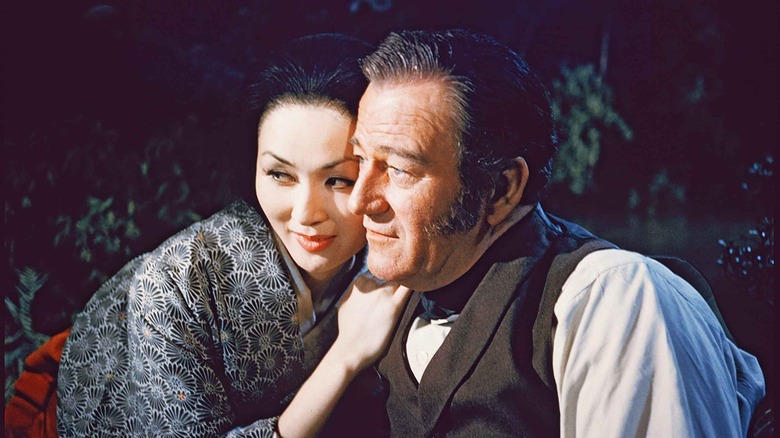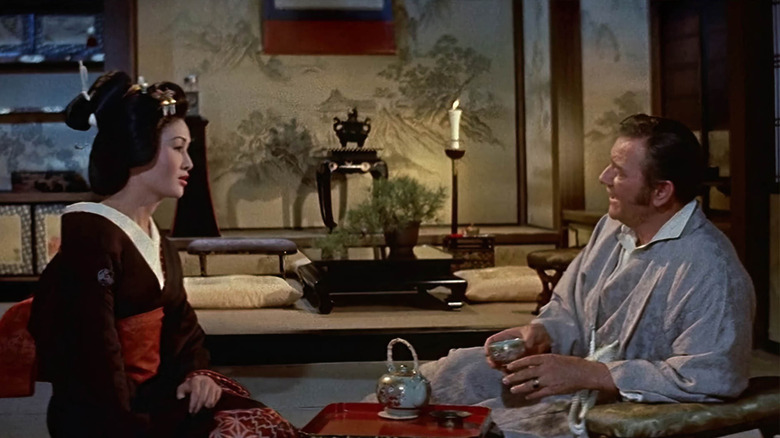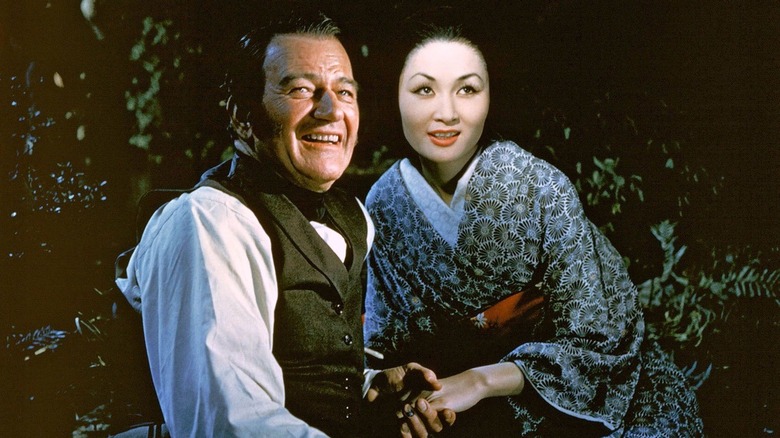John Wayne Considered Working With John Huston One Of The Biggest Mistake Of His Career
Signing on two Hollywood legends doesn't always guarantee success — in fact, sometimes having two big personalities on set is exactly what destines a project to fail. Such was the case with John Huston's 1958 film "The Barbarian and the Geisha," starring the Duke himself, John Wayne. The director and actor both had storied careers with countless iconic movies, but surprisingly their collaboration was a total flop.
Wayne ran into problems with the director as soon as production began. Huston ignored the actor's notes and dismissed his concerns. "I ask him what's on tomorrow's shooting schedule and he'll tell me to spend more time absorbing the beauty of the scenery and less time worrying about my part," Wayne lamented (via John Wayne). "When I tell him I can't memorize the script unless I know what we'll be shooting, the bastard says, 'Don't worry, we'll improvise.'"
The actor quickly grew frustrated and turned to the press for an outlet. "After a couple of weeks out here with no action, I had to make up my mind whether to quit and go home and let them sue me, or stay and trust in God and Huston," Wayne candidly informed his interviewers.
Despite his reservations about Huston, Wayne decided to remain on set in Japan. "I decided to stay. Anyway, I was in too deep to get out," he explained. Unfortunately, his troubles were far from over.
The actor took over post-production
Anyone that knew Wayne and Huston well may have said that their creative partnership was doomed from the very beginning. "They had nothing in common. John Wayne loathed him," Huston's script supervisor Angelica Allen recalled. "He used to say, 'I'm gonna kill him!' I said, 'I'll fix up the appointment, what time do you want to come?' But he didn't want to be left alone with Huston."
The Duke wasn't afraid of his director, but he was afraid of his own temper getting away from him. "He was very regimented and could only go in one way. Very professional, but he wasn't that bright," Allen added. The actor instead expressed his discontent in a letter to his long-time collaborator John Ford. "It's a little frustrating trying to arouse the [...] sleeping talent of our lead, Mr. Huston," he wrote.
Huston may not have been "sleeping," but he certainly lacked the firm hand that Wayne admired in a director. When production ended, he left Hollywood to make his next film. The actor took advantage of Huston's absence and decided to remake several scenes because he didn't like the way his hair looked or "to give [his character] some vitality."
Wayne ended up calling all the shots and completely transformed the film in post. Huston did not take kindly to being overruled. "When I brought it back to Hollywood, the picture, including the music, was finished ... It was a sensitive, well-balanced work," he wrote in his memoir twenty years later. "John Wayne apparently took over after I left... and when I saw it, I was aghast."
When the film flopped, Wayne and Huston blamed each other
"The Barbarian and the Geisha" was a massive box office failure. Huston blamed Wayne for meddling in post-production and Wayne blamed Huston for poor direction. The men held grudges against one another for the rest of their lives. "When I look back at his career, Bogie and his dad helped him get started," Wayne said, years after their 1958 film was released. "Outside of 'Moulin Rouge' and 'Asphalt Jungle,' I don't think he's made anything worthwhile when they weren't there to help him."
Huston had successful working relationships with many big Hollywood names, such as Humphrey Bogart, whom he directed six times. He even launched a few notable careers, including Marilyn Monroe, who had a small part in "Asphalt Jungle." However, "The Barbarian and the Geisha" was not the first time an actor had to step in during post-production of a Huston film. In their last film together, "Beat the Devil," Bogart totally took over the editing process and declared the film "a mess," per /Film.
Huston was too hands-off and refused to hear Wayne's notes because he was overconfident and dismissive. On the other hand, Wayne was too overbearing. In the end, the actor was unable to save the film and wielded his star power to make vain decisions. Sadly, these two great minds never did see eye to eye, and they never worked together again.


